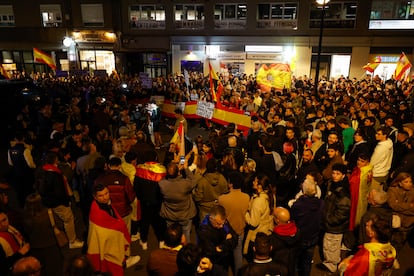Amnesty deal between Spain’s PM and Catalan separatists fuels protests
Around 8,000 people marched in Madrid and 3,000 in Granada against the agreement that paves the way for PM Pedro Sánchez to remain in power. The opposition leader has called a fresh demonstration for Sunday

The signing on Thursday of a deal between Spain’s Socialist Party (PSOE) and Catalan separatists that paves the way for Prime Minister Pedro Sánchez to remain in power has further fueled protests across Spain. In Madrid, the seventh demonstration in a week began in front of the European Parliament delegation, on Paseo de la Castellana, where around 1,500 people gathered before slowly making their way to PSOE headquarters on Ferraz Street. Government officials in Madrid estimated that around 8,000 people participated in the march, up from the estimated 7,000 who showed up on Wednesday.
There were also protests in other parts of Spain. In the southern city of Granada, around 3,000 people came out to march against an agreement to extend amnesty to Carles Puigdemont, the leader of the failed Catalan secession attempt of 2017 who now lives in self-imposed exile in Belgium, as well as to other individuals who participated in those acts. In exchange for the amnesty bill, Puigdemont’s Junts party, which has seven lawmakers inside the Spanish parliament, has pledged to back Sánchez’s bid to form a national government following a July election that did not give any party enough votes for an absolute majority.
In Barcelona, the Catalan capital, a smaller group of around 350 people congregated in front of the government delegation building for a peaceful protest, and in the city of Valencia several hundreds marched to demand Sánchez’s resignation and prison for Puigdemont. There was a smaller crowd outside PSOE headquarters in Alicante.

Spain’s mainstream conservative Popular Party (PP), the main opposition party, has called for its own protest against the amnesty for Sunday, in public squares in each provincial capital. “I am not going to allow for my country to have to ask forgiveness to those who attacked its institutions,” said its leader, Alberto Núñez Feijóo. Feijóo attempted to form a government right after the July election as the head of the most-voted party, but failed, opening the door for Sánchez to try.
Despite the tension and verbal violence, the rallies have been generally peaceful, with numerous participants doing their best to contain those who showed more aggressive attitudes or displayed neo-Nazi symbols. However, in Madrid a group of radicals launched flares against the riot police, who charged to disperse these small violent groups. There were 24 arrests and seven police officers were treated for mild injuries, according to a government report issued on Friday.

The Madrid march caused traffic cuts as protesters made their way from Paseo de Castellana to Ferraz. Some cars honked their horns while a few residents came out on their balconies and shouted “Long live Spain!” Cries of “They are not fooling us, Catalonia is Spain!” and “Puigdemont, to prison!” were also heard. The protest, which was attended by families with children, gradually heated up, with shouts such as “Pedro Sánchez, you son of a bitch!” The most often seen flag on display was the Spanish one with a huge hole in it and without the constitutional shield. There were also more elaborate banners with messages not seen in previous days, including some in English asking Europe for help, such as “Europe save us from terrorism” and “PSOE is killing Spanish democracy.”
The leader of the hard-right Vox party, Santiago Abascal, joined the Thursday rally in Ferraz, and drew applause from many demonstrators. “I come as another Spaniard in the face of the greatest attack on the unity of Spain of the entire democratic period,” said the leader of the ultranationalist party, which secured 33 seats at the last election. Other Vox leaders joined the protests elsewhere in the country.
With additional reporting by Ferran Bono and Rafa Burgos.
Sign up for our weekly newsletter to get more English-language news coverage from EL PAÍS USA Edition
Tu suscripción se está usando en otro dispositivo
¿Quieres añadir otro usuario a tu suscripción?
Si continúas leyendo en este dispositivo, no se podrá leer en el otro.
FlechaTu suscripción se está usando en otro dispositivo y solo puedes acceder a EL PAÍS desde un dispositivo a la vez.
Si quieres compartir tu cuenta, cambia tu suscripción a la modalidad Premium, así podrás añadir otro usuario. Cada uno accederá con su propia cuenta de email, lo que os permitirá personalizar vuestra experiencia en EL PAÍS.
¿Tienes una suscripción de empresa? Accede aquí para contratar más cuentas.
En el caso de no saber quién está usando tu cuenta, te recomendamos cambiar tu contraseña aquí.
Si decides continuar compartiendo tu cuenta, este mensaje se mostrará en tu dispositivo y en el de la otra persona que está usando tu cuenta de forma indefinida, afectando a tu experiencia de lectura. Puedes consultar aquí los términos y condiciones de la suscripción digital.








































